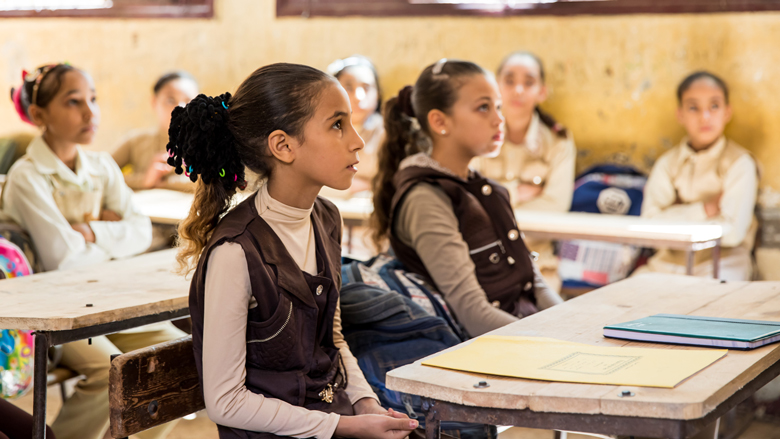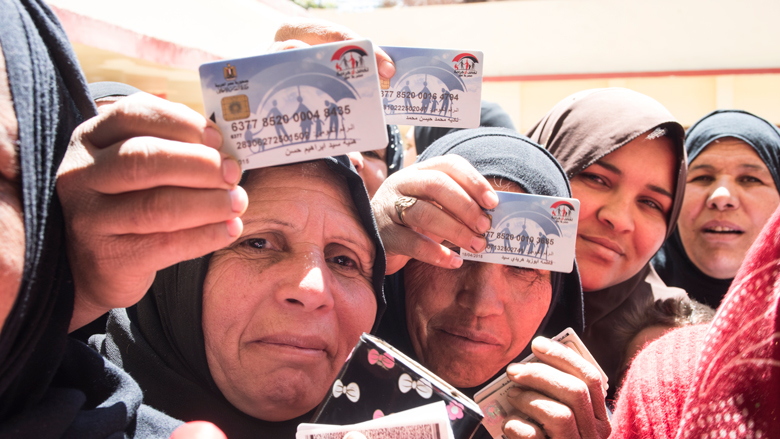The gap in productivity is an indication of how much income Egypt is missing out due to the quality of health and education services. At the same time, it is an indication of the immense opportunity to improve these key services to ensure every citizen can reach his or her full potential, which will boost overall productivity and contribute to growth.
As an early adopter of the Human Capital Project, Egypt has shown that it is committed to addressing the gap in human capital outcomes. To achieve this goal, the World Bank is partnering with Egypt to raise the quality of health and education services, and to expand the reach and improve the targeting of social safety nets. Below are a few examples of the results of this partnership:
The Takaful and Karama Social Safety Net Program: this conditional (Takaful) and unconditional (Karama) cash transfer program, is among Egypt’s largest investments in human capital development and has covered to date approximately 2 million households, which amounts to approximately 9 million individuals, (approximately 10% of Egypt’s population). The parent operation was launched in 2015 through a US$400 million World Bank loan. The operation’s success led to the approval of an additional financing of US$500 million in July 2019.
Takaful provides conditional, monthly family income support aimed at protecting poor households from the short-term negative impacts of the economic reform program. Since 2014, the reforms have included the removal of energy subsidies, the introduction of Value-Added-Taxes and the flotation of the Egyptian Pound; all of which posed economic challenges for the most vulnerable.
Along with ensuring income support for poorer households, Takaful also encourages families to keep their children in school and provides them with needed health care. The goal is to build the ‘human capital’ of the next generation and give them a path out of poverty. The program is ‘conditional’, meaning that households receive their monthly transfer providing they are compliant with certain clearly defined requirements. These include all household children aged 6 to 18 having at least an 80% school attendance record, four visits per year to health clinics by mothers and children below the age of 6, maintaining child growth monitoring records, and attending nutrition awareness sessions.
Karama aims to protect Egypt’s poor elderly citizens above 65 years of age and citizens with severe disabilities and diseases, as well as orphans. These vulnerable citizens receive a monthly unconditional pension.
The independent impact evaluation conducted by the International Food Policy Research Institute (IFPRI) has shown that the Takaful transfers have improved household dietary consumption, investments in health and education as well as women’s sense of empowerment.
The operation’s additional financing aims to continue supporting the World Bank’s commitment to promoting human capital development through well targeted and efficient social safety nets. It will combine boosting the reach and efficiency of the Takaful and Karama Program, with piloting of economic inclusion models including wage employment, self-employment and training of members of poorer households linking them to viable economic opportunities. The economic inclusion interventions will have a special focus on women and youth.
The Transforming Egypt’s Healthcare System Project: The World Bank is supporting this project with US$530 million in financing. The project aims to improve services at 600 primary healthcare facilities and 27 hospitals.
The project is also an investment in Egypt’s family planning efforts, the scale up of a community health workers program to promote better health and nutrition and the screening of 1 million units of blood annually for various pathogens.
The project will also conduct the largest campaign for screening Hepatitis C, non-communicable diseases and risk factors. This campaign is named ‘’ 100 Milyon Seha’’ or ‘’100 Million Healthy Lives’’ and aims to screen 53 million citizens and residents as well as treat an estimated 2.2 million Hepatitis C patients free of charge.
With the recent enactment of the Comprehensive Health Insurance law, demand for quality healthcare is expected to grow. The new project is designed to meet that demand. Egypt’s Hepatitis C program has become an example for developing countries in ensuring that the poorest segment of the population has access to cutting-edge treatments at affordable costs which are expected to be further lowered through the project.
The Supporting Egypt Education Reform Project: This operation supports transformational reforms of the Egyptian education system by improving teaching and learning conditions in public schools. The World Bank has invested US$500 million in the project which aims to: (1) increase access to quality kindergarten (KG); (2) enhance the capacity of teachers, education leaders and supervisors; (3) develop a reliable student assessment and examination system, and (4) introduce the use of modern technology for teaching and learning, assessing students, and collecting data, as well as expanding the use of digital learning resources.
By the end of the project, the goal is to have 500,000 new students enrolled in Kindergarten (KG) 1-2 of which 50% are from the poorest districts; 35% of teachers demonstrating improved practices; 40% increase in female teachers; 2 million students experiencing the new grade 4 and grade 9 assessments and the reformed secondary school graduation and examination system.
The project will also see the first cohort of secondary stage students (grade 10 students in 2018/2019) graduate under the new cumulative score- based assessment and certification system in Summer 2021; and digital learning resources available for all core subjects from KG1 to grade 12, with 40% of digital learning resources in the poorest five governorates.
Building physical capital, such as roads and bridges, can deliver immediate results while the benefits of investing in human capital, such as in a child’s education, are more long term. Yet it is essential that all children arrive at school ready to learn, the time spent in school translates into better learning, and they can grow up to live and work as healthy, skilled, and productive adults.
This is building human capital and it is critical for long term, sustainable growth. The drive for economic growth must include a strategy for building both human and physical capital. The World Bank is committed to continue supporting Egypt’s economic reforms as well as its human capital investments so that the country fulfills its sustainable and inclusive development potential.


